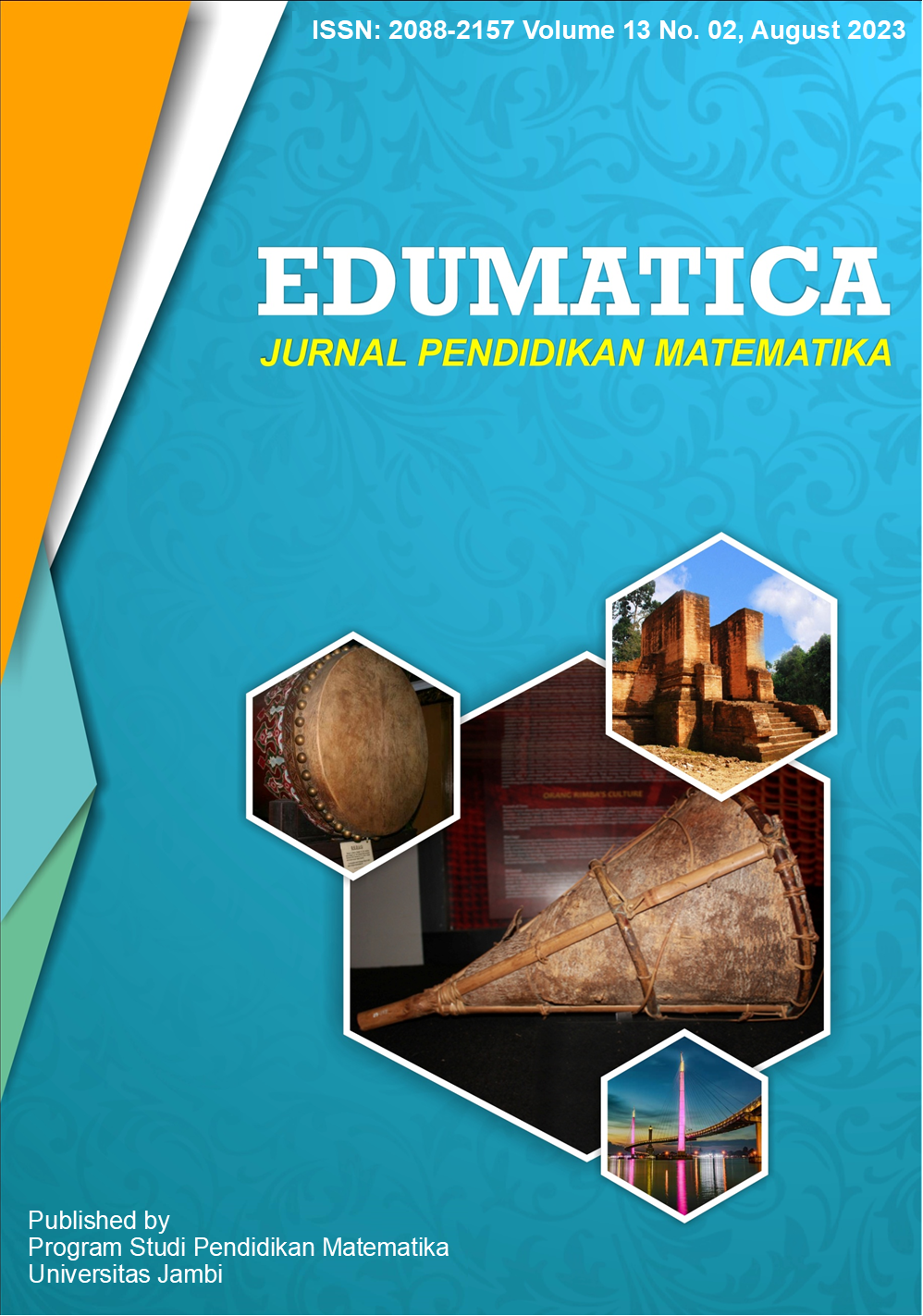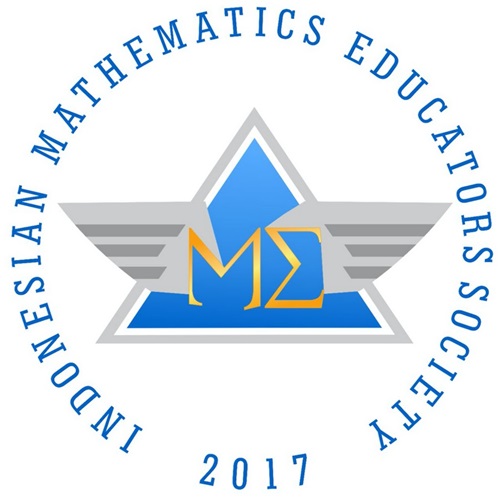Effectiveness of Missouri Mathematics Project (MMP) Learning Model on Students' Mathematical Literacy Skills in View of Self-Efficacy
DOI:
https://doi.org/10.22437/edumatica.v13i02.24487Keywords:
mathematics literacy, Missouri Mathematics Project (MPP), self-efficacyAbstract
Indonesia is a country with low mathematical literacy skills. Improving the learning model is an action that can be taken to improve students' mathematical literacy skills. The Missouri Mathematics Project (MMP) learning approach is a learning approach that is considered effective in improving mathematical literacy skills. In addition to this, self-efficacy is another factor that can affect students' mathematical literacy skills. The purpose of this study was to determine the effectiveness of the Missouri Mathematics Project (MMP) learning model on students' mathematical literacy in terms of self-efficacy. This study used a quantitative research approach with a quasi-experimental method. The research instruments used essay tests and questionnaires. Hypothesis testing uses the Two-Way Anova test of Unequal Cells. The results concluded that there was an effect of Missouri Mathematics Project (MMP) learning model and self-efficacy on students' mathematical literacy. The interaction of different learning models and self-efficacy has no effect on students' mathematical literacy skills. The results obtained Fcount = 0.106 < Ftable = 4.001 which means H0 is accepted. This means that both conventional learning models and Missouri Mathematics Project (MMP) learning models students with high self-efficacy categories have superior mathematical literacy skills compared to students with moderate or low self-efficacy categories. Based on the research results, it can be concluded that there is an effect of Missouri Mathematics Project (MMP) learning model and self-efficacy on students' mathematical literacy.
Downloads
References
Ananda, E. R., & Wandini, R. R. (2022). Analisis Kemampuan Literasi Matematika Siswa Ditinjau dari Self Efficacy Siswa. Jurnal Obsesi : Jurnal Pendidikan Anak Usia Dini, 6(5). https://doi.org/10.31004/obsesi.v6i5.2659
Busnawir, Misu, L., Sudia, M., Idris, M., & Sadikin. (2021). Analysis of Mathematical Literacy Ability in Terms of Self-Efficacy High and Low. International Journal of New Trends in Arts, Sports & Science Education, 10(5), 316-325.
Coskun, H. (2019). Investigating the Visual Mathematics Literacy Self-Efficacy (VMLSE) Perceptions of Eighth Grade Students and Their Views on This Issue. International Journal of Educational Methodology, 5(1), 165-176. https://doi.org/10.12973/ijem.5.1.177
Genc, M., & Erbas, A. K. (2019). Secondary mathematics teachers’ conceptions of mathematical literacy. International Journal of Education in Mathematics, Science and Technology, 7(3), 222-237.
Geraldine, M., & Wijayanti, P. (2022). Literasi Matematika Siswa dalam Menyelesaikan Soal PISA Konten Change and Relationship Ditinjau dari Self Efficacy. Jurnal Riset Pendidikan Dan Inovasi Pembelajaran Matematika (JRPIPM), 5(2). https://doi.org/10.26740/jrpipm.v5n2.p82-102
Ginanjar, A. Y., & Akmal, R. (2021). Efektivitas Lembar Kerja Untuk Meningkatkan Kemampuan Literasi Matematika Mahasiswa PGSD. Jurnal Basicedu, 5(1). https://doi.org/10.31004/basicedu.v5i1.655
Gunadi, F., & Siti Aisah, L. (2019). Comic’s Mathematics Learning: Pembelajaran Matematika Untuk Mengembangkan Kemampuan Literasi Matematis Siswa. M A T H L I N E : Jurnal Matematika Dan Pendidikan Matematika, 4(2), 128-138. https://doi.org/10.31943/mathline.v4i2.113
Harianda, B., & Junedi, B. (2021). Peningkatan kemampuan pemecahan masalah matematis siswa melalui penerapan model pembelajaran missouri mathematic project. Journal of Didactic Mathematics, 2(1). https://doi.org/10.34007/jdm.v2i1.616
Hidayah, A., & Aulia, I. (2015). Penerapan Model Pembelajaran Missouri Mathematics Project (MMP) terhadap Kemampuan Pemecahan Masalah Siswa di SMP. EDU-MAT: Jurnal Pendidikan Matematika, 3(1). https://doi.org/10.20527/edumat.v3i1.629
Hiller, S. E., Kitsantas, A., Cheema, J. E., & Poulou, M. (2021). Mathematics Anxiety and Self-Efficacy as Predictors of Mathematics Literacy. International Journal of Mathematical Education in Science and Technology. https://doi.org/10.1080/0020739X.2020.1868589
Istiqomah, P., Kamid, & Effendi-Hasibuan, M. H. (2022). Pengaruh Model Realistic Mathematics Education Terhadap Kemampuan Literasi Matematika Siswa Ditinjau Dari Self Efficacy Siswa. AKSIOMA Journal of Mathematics Education, 10(4).
Jamil, N. A., Anggoro, B. S., & Gunawan, W. (2021). Analisis Kemampuan Literasi Matematis Dan Burnout Berpikir Kreatif Peserta Didik Berdasarkan Pembelajaran MMP (Somatic, Auditory, Visual and Intellectually). PHI: Jurnal Pendidikan Matematika, 5(2), 141. https://doi.org/10.33087/phi.v5i2.149
Khoirunnisa, Salsabila, E., & Santi, V. M. (2021). Pengaruh Model Pembelajaran Missouri Mathematics Project dan Self-Efficacy terhadap Kemampuan Berpikir Kritis Siswa. Jurnal Riset Pembelajaran Matematika Sekolah, 5(1), 74-79. https://doi.org/10.31540/jmse.v2i1.581
Murtiyasa, B., & Perwita, W. R. G. (2020). Analysis of Mathematics Literation Ability of Students in Completing PISA-Oriented Mathematics Problems with Changes and Relationships Content. Universal Journal of Educational Research, 8(7). https://doi.org/10.13189/ujer.2020.080745
Nurcahyo, A., & Sudibyo, N. A. (2020). Eksperimentasi Model Pembelajaran TAI AFL Terhadap Hasil Belajar Matematika Siswa SMP Pada Materi Bilangan. Jurnal Lebesgue : Jurnal Ilmiah Pendidikan Matematika, Matematika Dan Statistika, 1(2), 113-122. https://doi.org/10.46306/lb.v1i2.24
Nurhaidah. (2017). Meningkatkan Hasil Belajar Matematika Melalui Model Pembelajaran Missouri Mathematics Project (MMP) Pada Siswa Kelas XI MIPA 1 Sekolah Menengah Atas Negeri 2 Watampone. JIKAP PGSD: Jurnal Ilmu Kependidiikan, 2(1).
Nurussobah, S., Nuryani, P., & Fitriani, A. D. (2021). Penerapan Model Missouri Mathematics Project Untuk Meningkatkan Kemampuan Pemecahan Masalah Matematis Siswa. JURNAL PENDIDIKAN GURU SEKOLAH DASAR, 6(1), 13. https://doi.org/https://doi.org/10.17509/jpgsd.v6i1.39997
OECD. (2018). PISA 2018 Result Combined Executive Summaries Volume I, II & III. Paris: OECD Publishing.
Pratiwi, N. P. K. A., Astawa, I. W. P., & Mahayukti, G. A. (2019). Missouri Mathematics Project (MMP), Pemahaman Konsep Matematika, dan Kepercayaan Diri Siswa. Jurnal Elemen, 5(2), 178. https://doi.org/10.29408/jel.v5i2.1317
Purwanti, K. L., & Mujiasih, M. (2021). Kemampuan Literasi Matematika Siswa Madrasah Ibtidaiyah Ditinjau dari Self-Efficacy. Journal of Integrated Elementary Education, 1(1), 50-65. https://doi.org/10.21580/jieed.v1i1.6975
Rahman, A. A., & Nasryah, C. E. (2020). Efektivitas Model Pembelajaran Missouri Mathematics Project untuk Meningkatkan Hasil Belajar Siswa SMA. Mosharafa: Jurnal Pendidikan Matematika, 9(2), 335-346. https://doi.org/10.31980/mosharafa.v9i2.650
Rini, Z. R., & Purwanti, K. Y. (2021). Problem Solving Ability Analysis Assessed From Self-Efficacy in The Missouri Mathematics Project Learning Model. ELEMENTARY: Islamic Teacher Journal, 9(1), 75. https://doi.org/10.21043/elementary.v9i1.9968
Rusdiyana, E. (2018). Efektivitas Model Pembelajaran Missouri Mathematics Project (MMP) dengan Media Permainan pada Pokok Bahasan Persamaan Garis Lurus. Kadikma, 9(1), 52-60.
Sari, L. M., & Asmara, A. (2021). Desain soal-soal kemampuan literasi matematis untuk siswa SMP. Journal of Didactic Mathematics, 2(3). https://doi.org/10.34007/jdm.v2i3.1002
Sofyan, M. (2021). The Effectiveness of the Application of the Missouri Mathematics Project Learning Model on Solving Mathematical Problem. International Conference on Educational Studies in Mathematics (ICoESM 2021), 611.
Suharta, I. G. P., & Suarjana, I. M. (2018). A Case Study on Mathematical Literacy of Prospective Elementary School teachers. International Journal of Instruction, 11(2). https://doi.org/10.12973/iji.2018.11228a
Susanto, D., & Sapti, M. (2006). Optimalisasi Pembelajaran Konvensional dengan Model Kontekstual. Jurnal Limit -Matematika ISSN 1858-4527, 2(2).
Ulya, A., & Hidayah, I. (2016). Kemampuan Pemecahan Masalah Ditinjau Dari Self-Efficacy Siswa Dalam Model Pembelajaran Missouri Mathematics Project. Unnes Journal of Mathematics Education Research, 5(2), 178-183. Retrieved from http://journal.unnes.ac.id/sju/index.php/ujmer
Umbara, U., & Suryadi, D. (2019). Re-interpretation of Mathematical Literacy Based on the Teacher’s Perspective. International Journal of Instruction, 12(4). https://doi.org/10.29333/iji.2019.12450a
Ummah, A., & Sari, R. N. (2018). Efektivitas Model Pembelajaran Missouri Mathematics Project (MMP) Terhadap Kemampuan Komunikasi Matematis Siswa SMP. Pythagoras, 7(1), 21-27. https://doi.org/10.33373/PYTHAGORAS.V7I1.1194
Utari, T. S. G., Kartasasmita, B. G., & Julika, C. (2019). The application of situation-based learning strategy to improve literacy skills, mathematical problem-solving ability and mathematical self-efficacy at senior high school students. International Journal of Innovation, Creativity and Change, 6(1), 89-102.
Winardi, & Dwijanto. (2017). Analisis Kemampuan Literasi Matematika melalui Model Missouri Mathematics Project dengan Pendekatan Open-Ended. Ujmer, 6(2).
Downloads
Published
How to Cite
Issue
Section
License
Copyright (c) 2023 Elis Setyowati, Adi Nurcahyo

This work is licensed under a Creative Commons Attribution-NonCommercial-ShareAlike 4.0 International License.







